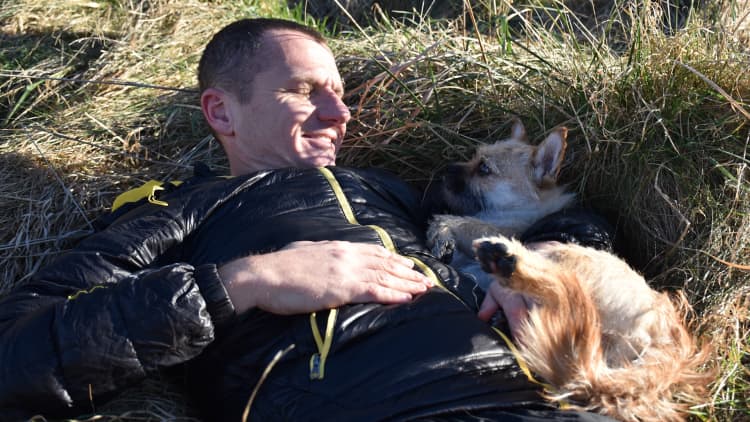Job-stealing robots seem to be on everybody's minds these days. Whatever the reason for lost jobs, people point fingers at the coming robotic workforce — but what if the scapegoat was an actual goat?
Cats and goats are increasingly being "hired" to do a wide range of jobs. Don't panic — animals may be helping to clear brush and catch rodents, but their new employment is not likely to affect the majority of Americans.
These workhorses are holding down jobs and replacing (very few) humans in the process:
Rufus the Hawk
Rufus the Hawk has worked at Wimbledon stadium as "chief pigeon scarer" for over a decade. The experienced professional is responsible for chasing off any pigeons trying to snack on the famous tennis court's grass.
His handler, Imogen Davis, tells CNN, "We're here all year round, but we start at 5 a.m. every morning during the championships."
Rufus' job has some enviable perks, including opportunities to meet famous athletes and bolster his cult social media following. "He's met Andy Murray. He's met Nadal. We had a chat to Boris Becker the other day," says Davis. Today, Rufus has over 10,000 followers on Twitter.
Fame however, is not always all it seems. In 2012, the celebrity hawk was kidnapped and held hostage for three days.
Goat Crew
A team of goats is causing controversy after Western Michigan University hired them to clear a woodlot.
The American Federation of State, County and Municipal Employees (AFSCME) recently filed a grievance with the university, arguing that these furry workers are taking jobs away from human union members.
Western Michigan spokesperson Cheryl Roland defends the university's decision, saying, "The area is rife with poison ivy and other invasive species, and our analysis showed the goats to be a sustainable and cost-effective way of removing them."
Many other institutions employ goats for the same reasons, including the historic Congressional Cemetery.
While the AFSCME may have a legitimate claim, The Washington Post asserts that it's unlikely goats will steal many American jobs. Christopher Ingraham calculates that if all of the 2.5 million meat and dairy goats in the United States were hired to control brush, only 347 full-time jobs would be lost.
Can-do Cats
In Commerce, California, a feral feline simply named "Black Cat" is responsible for protecting the Los Angeles Distributing Company from rodents. Black Cat is one of hundreds of homeless feral cats who provide pest control services for companies across the country.
In Los Angeles, Best Friends Animal Society has placed 75 cats with jobs and in St. Paul Minnesota, the Animal Humane Society has paired 336 cats with businesses through the Barn and Business Cat Program. In Baltimore, Amber Ketchum, the alternative placement coordinator for the Baltimore Animal Rescue and Care Shelter, tells USA Today that she has found jobs for 54 homeless cats at urban warehouses, breweries, vineyards and more.
Many of these animals would otherwise be euthanized. Marc Peralta, director of Best Friends' Los Angeles shelter, explains to USA Today that it's better to put these cats to work rather than put them down. "It's a different way to save their lives," he says.
Like this story? Like CNBC Make It on Facebook
Don't miss:
3 tricks to boost your mental toughness, from an ultra-marathoner and his dog
Owning a pet can cost you $42,000, or 7 times as much as you expect



